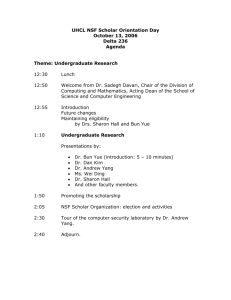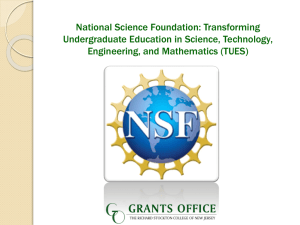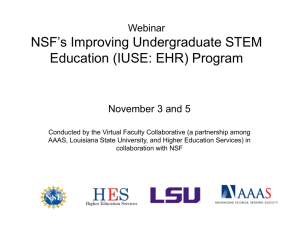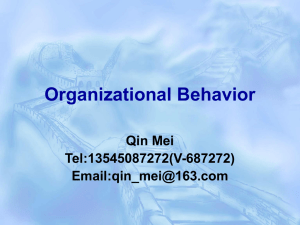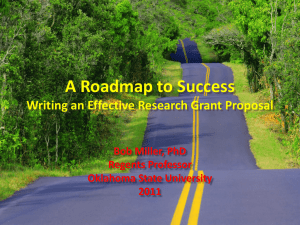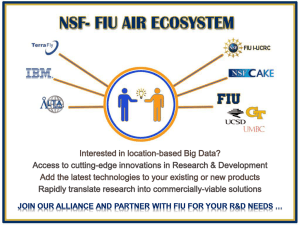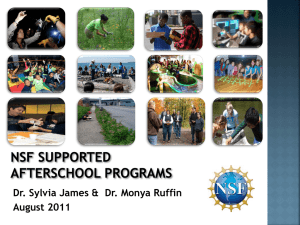DCL_14-033_ClearedVersion
advertisement
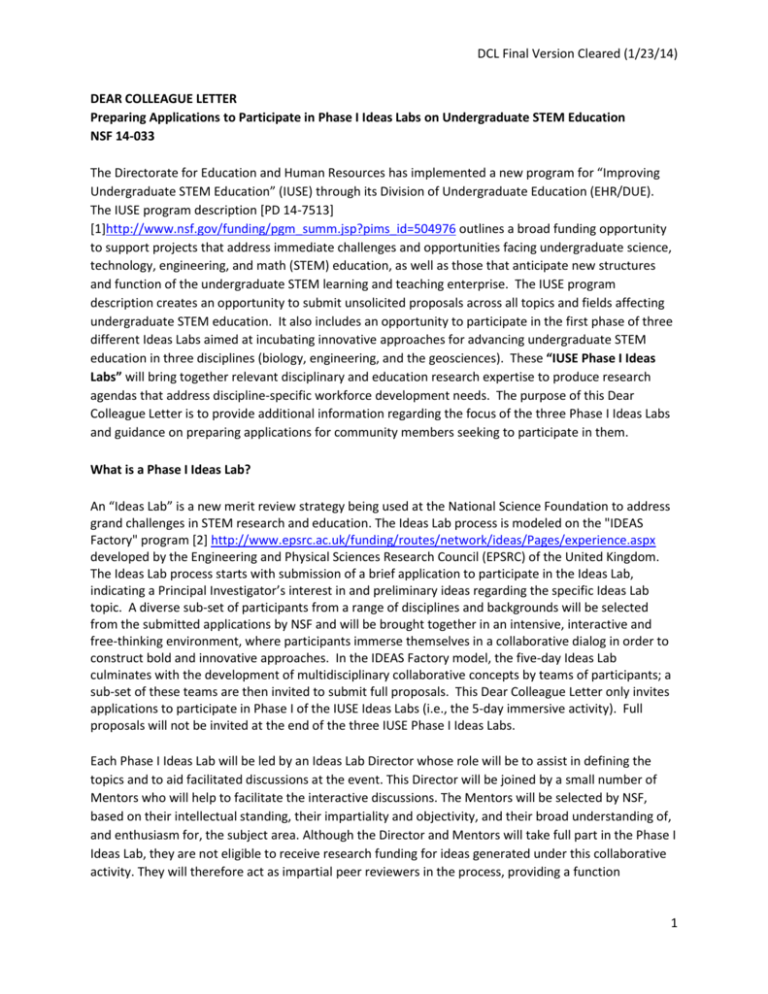
DCL Final Version Cleared (1/23/14) DEAR COLLEAGUE LETTER Preparing Applications to Participate in Phase I Ideas Labs on Undergraduate STEM Education NSF 14-033 The Directorate for Education and Human Resources has implemented a new program for “Improving Undergraduate STEM Education” (IUSE) through its Division of Undergraduate Education (EHR/DUE). The IUSE program description [PD 14-7513] [1]http://www.nsf.gov/funding/pgm_summ.jsp?pims_id=504976 outlines a broad funding opportunity to support projects that address immediate challenges and opportunities facing undergraduate science, technology, engineering, and math (STEM) education, as well as those that anticipate new structures and function of the undergraduate STEM learning and teaching enterprise. The IUSE program description creates an opportunity to submit unsolicited proposals across all topics and fields affecting undergraduate STEM education. It also includes an opportunity to participate in the first phase of three different Ideas Labs aimed at incubating innovative approaches for advancing undergraduate STEM education in three disciplines (biology, engineering, and the geosciences). These “IUSE Phase I Ideas Labs” will bring together relevant disciplinary and education research expertise to produce research agendas that address discipline-specific workforce development needs. The purpose of this Dear Colleague Letter is to provide additional information regarding the focus of the three Phase I Ideas Labs and guidance on preparing applications for community members seeking to participate in them. What is a Phase I Ideas Lab? An “Ideas Lab” is a new merit review strategy being used at the National Science Foundation to address grand challenges in STEM research and education. The Ideas Lab process is modeled on the "IDEAS Factory" program [2] http://www.epsrc.ac.uk/funding/routes/network/ideas/Pages/experience.aspx developed by the Engineering and Physical Sciences Research Council (EPSRC) of the United Kingdom. The Ideas Lab process starts with submission of a brief application to participate in the Ideas Lab, indicating a Principal Investigator’s interest in and preliminary ideas regarding the specific Ideas Lab topic. A diverse sub-set of participants from a range of disciplines and backgrounds will be selected from the submitted applications by NSF and will be brought together in an intensive, interactive and free-thinking environment, where participants immerse themselves in a collaborative dialog in order to construct bold and innovative approaches. In the IDEAS Factory model, the five-day Ideas Lab culminates with the development of multidisciplinary collaborative concepts by teams of participants; a sub-set of these teams are then invited to submit full proposals. This Dear Colleague Letter only invites applications to participate in Phase I of the IUSE Ideas Labs (i.e., the 5-day immersive activity). Full proposals will not be invited at the end of the three IUSE Phase I Ideas Labs. Each Phase I Ideas Lab will be led by an Ideas Lab Director whose role will be to assist in defining the topics and to aid facilitated discussions at the event. This Director will be joined by a small number of Mentors who will help to facilitate the interactive discussions. The Mentors will be selected by NSF, based on their intellectual standing, their impartiality and objectivity, and their broad understanding of, and enthusiasm for, the subject area. Although the Director and Mentors will take full part in the Phase I Ideas Lab, they are not eligible to receive research funding for ideas generated under this collaborative activity. They will therefore act as impartial peer reviewers in the process, providing a function 1 DCL Final Version Cleared (1/23/14) analogous to that of an NSF review panel. Interactions among the participants will also be assisted by a team of professional facilitators. Each Phase I Ideas Lab will run over five days, starting mid-morning on day one and finishing midafternoon on day five. At the outset, participants will work collaboratively to identify and define the scope of the research challenges relating to the specific workforce topic of their Ideas Lab (see below). An important early step in the process is to develop common languages and terminologies amongst people from a diverse range of backgrounds and disciplines, as well as a shared understanding of the challenges. As the discussion progresses, participants will build up thoughts about how the identified challenges may be addressed and develop their innovative ideas and activities into worthwhile collaborative research projects, which should contain genuinely novel and potentially risk-taking investigations. “Real-time” peer review from the Mentors will help to further refine project concepts. The nature of the Ideas Lab process requires a high degree of trust between participants in order to make the required breakthroughs in thinking about the role of undergraduate education in STEM workforce development. This trust extends to allowing the free and frank exchange of ideas, some being in the very early stages of development. The aim of an Ideas Lab is not to discuss ideas that are already well-developed but not yet published. Rather, the goal is to bring individuals from different disciplines together to interact and engage in free thinking on first principles, to learn from one another and create an integrated vision for future research projects. It is expected that the sharing of these ideas would be encouraged within the Ideas Lab; but, their confidentiality would be respected outside the Ideas Lab. Who Should Apply to Participate? Having the right mix of participants will help to influence the success or failure of such an activity. Applications are encouraged from individuals representing diverse research areas across a range of disciplines, as well as representatives of stakeholder communities, including prospective employers and scientific and professional societies serving the relevant disciplines. Contributions to the challenges identified below could be made by researchers working in a variety of disciplines or research areas that are relevant to the specific topic of the Phase I Ideas Lab. The disciplines that should be represented at these Ideas Labs are not being identified; instead, potential participants are asked to indicate how their expertise can address the challenges of the specific Ideas Lab to which they are applying. While it would be beneficial for applicants to have some prior knowledge of the challenges associated with undergraduate STEM education and workforce development for biology, engineering, or the geosciences, it is more important that applicants demonstrate an enthusiasm for cross-disciplinary research, as the future of this research area will require input from many disciplines. The ability to develop and pursue a new approach will also be crucial. Expertise is required from a very broad range of disciplines, and applicants should not feel limited by conventional perceptions: the Ideas Lab approach is about bringing people together who would not normally interact. People who are experts in their own research areas but have not yet applied it to this challenge are encouraged to apply. 2 DCL Final Version Cleared (1/23/14) This is an opportunity to share ideas and develop future collaborations. Participants are welcomed at any stage of their research career; however, they must be eligible to apply for funding from NSF1. Specific Themes of the IUSE Phase I Ideas Labs As noted in the IUSE program description, a well-prepared, innovative science, technology, engineering and mathematics (STEM) workforce is crucial to the Nation's health and economy. Achieving NSF priorities of educating students to be leaders and innovators in emerging and rapidly changing STEM fields as well as educating a scientifically literate populace depends on the nature and quality of the undergraduate education experience. NSF invests in research-based and research-generating approaches to understand STEM learning and develop and disseminate best practices for STEM instruction, with the goals of increasing student retention in STEM, broadening participation in STEM of underrepresented populations, preparing students well to participate in the science of tomorrow, and improving students’ STEM learning outcomes. Recognizing disciplinary differences and priorities, NSF’s investment in research and development in undergraduate STEM education encompasses a range of approaches. These approaches include: experiential learning, assessment/metrics of learning and practice, scholarships, foundational education research, professional development/institutional change, formal and informal learning environments, and undergraduate disciplinary research. The IUSE program description has invited participation in Ideas Labs for three different disciplines, each of which has unique priorities and needs regarding workforce development. Together, they define a portfolio of issues that have broader relevance among all NSF-supported disciplines, suggesting there is potential that many of the strategies derived through the Ideas Lab process may have broader application. The specific topics to be addressed by the IUSE Ideas Labs are described here: Biology The biological sciences workforce for the future, including graduates of two-year schools, four-year institutions, and graduate programs, will need mathematical and computational skills beyond those of its predecessors. These tools also are required across the wide spectrum of biological sub-disciplines. Such universal need for enhanced quantitative and computational expertise is reflected in the prominence of these proficiencies among the set of core competencies identified by the community of biological scientists in the Vision and Change in Undergraduate Biology Education: A Call to Action ([3]http://visionandchange.org/files/2011/03/Revised-Vision-and-Change-Final-Report.pdf). Specifically, these are “the ability to use quantitative reasoning” and “the ability to use modeling and simulation”, to gain a deeper understanding of the dynamics and complexity of biological systems. In addition, many areas of biology, from molecular, organismal through ecosystems studies, are reliant on large databases. Biologists of the future will require the mathematical and theoretical foundations necessary to abstract systems-level knowledge from complex data sets. These skills will be important also for proper database management, preservation of the data collected, and effective use of the information they contain. 1 Eligibility information is available in Chapter I, Section E of the NSF Grant Proposal Guide [NSF 13-001], available at http://www.nsf.gov/publications/pub_summ.jsp?ods_key=gpg 3 DCL Final Version Cleared (1/23/14) The Biology Phase I Ideas Lab will consider strategies to integrate these critical competencies in quantitative literacy into a biology core curriculum and to study their effectiveness and/or impact to generate knowledge that will inform their broader implementation. Strategies to foster the success of a diverse student population and to optimize the future workforce opportunities for all students are strongly encouraged. Engineering Social inequality in engineering education and practice is a durable problem, one that has resisted perennial efforts to "broaden participation," "increase diversity," or "improve recruitment and retention of women, minorities, and people with disabilities." While a great deal of previous and ongoing work has focused on fostering the ability of individuals to access and persist in the engineering education system, this Ideas Lab will focus on changing the system itself. Ending inequality in engineering is crucial because it represents a direct and effective way to meet workforce needs; because members of marginalized groups should not be on the sidelines in shaping our infrastructure and technological future; because workforce diversity strengthens work product; and because increased participation in high paying, prestigious workforce sectors like engineering is itself a strategy for achieving greater equity. Many prior efforts for inclusion have been hampered by a presumption that certain parameters can't be changed (for example, eligibility criteria, narrow definitions of what counts in or as engineering, limited roles for 2-year institutions, or a four year degree model). This ends in disappointment and frustration when change is not achieved. A radical rethinking is needed to move forward. In the Engineering Phase I Ideas Lab, engineers and social scientists will face head on the systems and structures that reproduce social inequality in engineering education and in the engineering workforce. A complete and direct discussion is not afraid to examine manifestations of racism, sexism, and ableism in engineering, and to also consider classism, heteronormativity, ageism, and obstacles faced by Veterans and other non-traditional groups. The Engineering Phase I Ideas Lab will generate new framings and new strategies to move the nation toward greater inclusion of marginalized groups in engineering. Geosciences A major obstacle to preparing the future geoscience workforce is lack of access to relevant undergraduate courses, degree programs, and research opportunities at community colleges and minority-serving institutions. Such institutions have limited capacity to establish sustainable, standalone undergraduate programs in the geosciences, thereby limiting student awareness of career opportunities in, and pathways into, the geosciences. Smaller institutions often cannot offer students opportunities to experience sophisticated instrumentation or data used in the geosciences. As many of these institutions serve traditionally underrepresented students pursuing STEM careers, these limitations pose barriers to increasing diversity in the geosciences workforce. The small size of the academic geoscience workforce compounds the situation by making it difficult to scale-up important 4 DCL Final Version Cleared (1/23/14) geoscience education activities, and especially field- and facilities-based experiences, in order to reach a larger student population. The rapidly evolving landscape of higher education offers new opportunities to develop innovative strategies for overcoming these obstacles. More widespread access to web-based content and coursework, as well as innovative pedagogical approaches, are improving access for students who might otherwise be excluded. Competency-based certificate programs that transcend the boundaries of “bricks and mortar” institutions illustrate some of the transformations underway that may foster development of highly customized, student-centered degree programs “without borders”. These changes raise important questions about how to ensure the quality of undergraduate education and integrate a panoply of experiences so that students leave with the necessary competencies and skills, whether as a member of the geoscience workforce or as a citizen confronting geoscience-relevant decisions. The Geosciences Phase I Ideas Lab is expected to bring together multi-disciplinary expertise representing all geoscience disciplines (including polar science), STEM education practice, cyber-learning, virtual organizations, diversity, and higher education administration, among others, to consider novel approaches to undergraduate geoscience education that develop essential competencies and skills for the workforce and increase access for diverse student populations. Locations and Dates of the IUSE Phase I Ideas Labs The Ideas Labs will be held during the dates of March 3-7, 2014, March 17-21, 2014, and March 31-April 4, 2014. Specific disciplines are not yet assigned to specific dates. The locations of the Ideas Labs have not been finalized, but all are expected to be held within a 75 mile radius of the Washington, DC metro region. Information on the assigned dates, site, travel information, and other logistics will be provided to all selected participants prior to the event. Travel and subsistence costs to attend one of the Phase I Ideas Labs will be reimbursed by NSF; all incidental costs incurred while at the event must be met by the participant. Applying to Participate in an IUSE Phase I Ideas Labs Submission of an application to participate in an IUSE Phase I Ideas Lab is required and will be considered an indication of availability to attend and participate through the full course of the fiveday Ideas Lab. Applicants are strongly encouraged to submit their application to participate by the IUSE program target date of February 4, 2014. Please note, the application to participate must come from one individual and cannot include co-PIs or collaborators. Participants in each Ideas Lab will be selected by NSF on the basis of information submitted in the application. The applications are limited to two pages of "Project Description," that should be submitted using only the NSF FastLane system [4]https://www.fastlane.nsf.gov/, not through Grants.gov. 5 DCL Final Version Cleared (1/23/14) In FastLane, select the “Prepare Proposal” option, followed by the “Create Blank Proposal” option. When preparing the Cover Sheet, select the IUSE program description [PD 14-7513] from the pull-down menu. “DUE-TUES-Type 1 Project” will be shown as the NSF Unit of Consideration; this is correct. Be sure to select the IUSE: Ideas Labs option from the drop-down menu on the Project Data Form associated with the NSF Cover Page. The Title should begin with either “BIO IUSE Ideas Lab:”, “ENG IUSE Ideas Lab:”, or “GEO IUSE Ideas Lab:” to indicate the applicant’s discipline of choice. The Project Description section of the application to participate should conform to the following guidelines: Page One: Provide a brief summary of your professional background (100 words maximum). Please note that if you are selected as a participant, information provided in answer to this question will be made available to the other participants, to facilitate networking at the Ideas Lab. Describe your experience and interest in working across disciplines (100 words maximum). Describe your key contribution(s) to addressing the specific STEM workforce development theme of this Ideas Lab (see above) through novel and potentially transformative approaches (no more than half a page). Indicate your ability or inability to participate during any of the scheduled Ideas Lab dates (March 3-7; March 17-21; March 31-April 4). Page Two: Please spend some time considering your answers to the following questions. Your responses should demonstrate that you have suitable skills and aptitude to participate in the Ideas Lab (unrelated to your research track record). What is your approach to working in teams? (100 words maximum) How would you describe your ability to engage non-experts or people with a different perspective to yours on this topic? (100 words maximum) The Ideas Lab encourages a free exchange of ideas: enjoying the sharing, shaping and building ideas over an intensive 5-day setting, working as an equal with individuals you may not know. How do you see yourself suited for this type of interaction? If possible, describe any comparable experience you have had. (150 words maximum). Applications to participate in one of the IUSE Phase I Ideas Labs must include a Biographical Sketch [5]http://www.nsf.gov/pubs/policydocs/pappguide/nsf13001/gpg_2.jsp#IIC2f and a Current and Pending Support [6]http://www.nsf.gov/pubs/policydocs/pappguide/nsf13001/gpg_2.jsp#IIC2h document prepared in accordance with standard NSF formatting guidelines. All other elements of a "full NSF proposal" are waived (Project Summary, References Cited, Budget, Budget Justification, Facilities, Equipment and Other Resources). Please avoid listing publications or web links in the Project Description. 6 DCL Final Version Cleared (1/23/14) No appendices or supplementary documents may be submitted. NSF program staff from EHR/DUE and the relevant research directorate will select the final list of participants from the submitted applications to participate. Ideas Lab participants will be selected on the basis of their interest in and preliminary ideas about the topic area, their expertise, and other characteristics described in their submitted applications. Given the iterative and progressive nature of the Ideas Lab format, participants should be willing to engage in frank disclosure and assessment of ideas in a collegial and professional fashion. The Ideas Lab is an arena of equals. Applicants will be assessed on how well they fit the need to be innovative, constructive and collaborative in an intensive 5day setting and their potential to perform well with the demands of a team project that might result from the event. The Ideas Lab approach is designed to support the development and implementation of creative and innovative project ideas that have the potential to transform research paradigms and/or solve intractable problems. It is anticipated that concepts developed through the three IUSE Phase I Ideas Labs will lead eventually to new proposals to NSF to engage in activities that will be high-risk/highimpact, as they represent new and unproven ideas, approaches and/or technologies. Joan Ferrini-Mundy Assistant Director Directorate for Education and Human Resources Roger Wakimoto Assistant Director Directorate for Geological Sciences Pramod Khargonekar Assistant Director Directorate for Engineering John Wingfield Assistant Director Directorate for Biological Sciences 7
